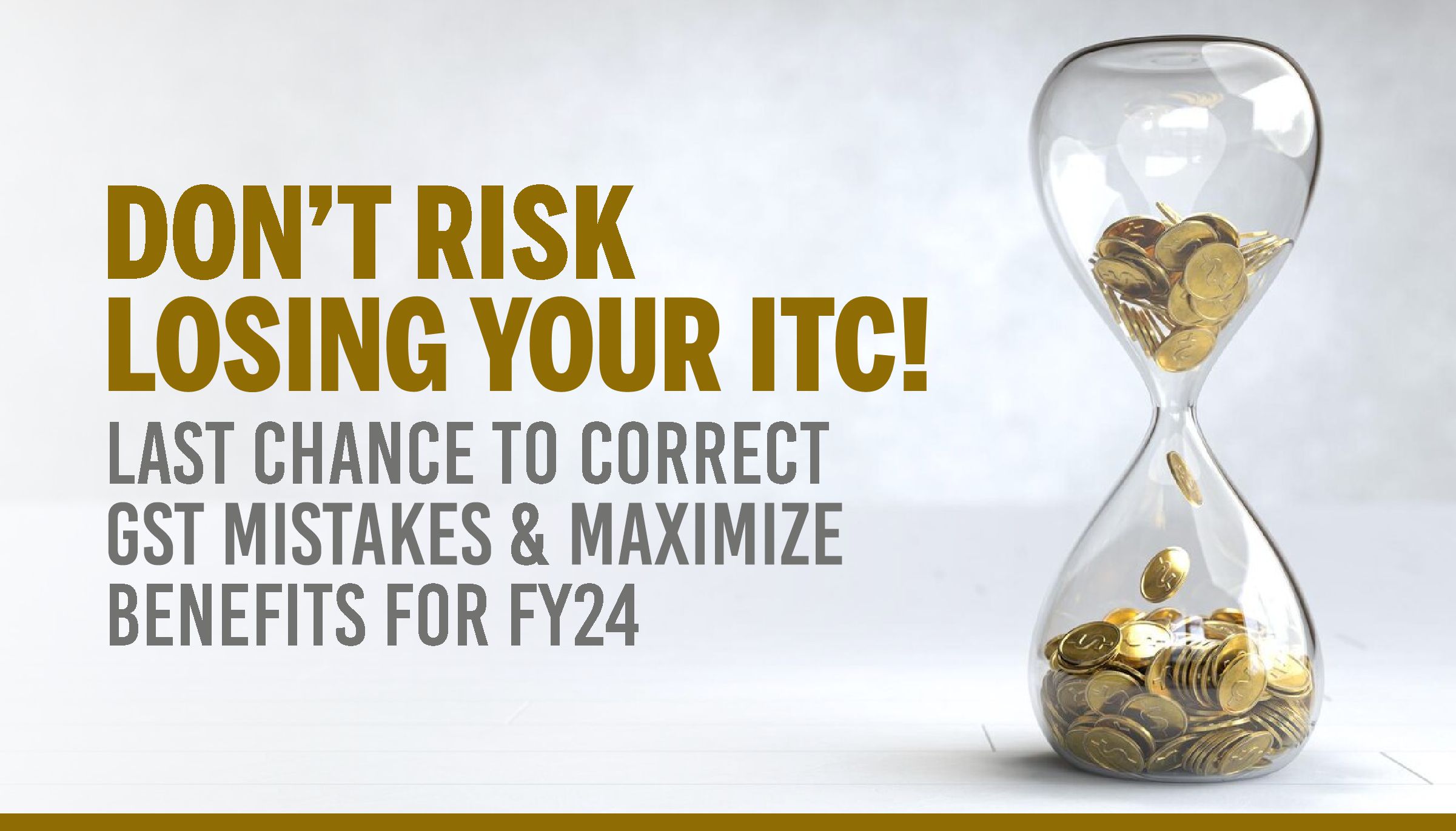Businesses Have Just 2 Weeks to Secure ITC and Correct GST Errors for FY24

Businesses have less than two weeks to finalize their Input Tax Credit (ITC) claims and address any discrepancies in Goods and Services Tax (GST) returns for the fiscal year 2023-24 (FY24). This final opportunity is crucial for taxpayers to avoid losing out on eligible ITC and to correct compliance errors that could lead to penalties. This article breaks down the necessary steps, deadlines, and recent changes that could impact taxpayers’ ability to claim ITC and rectify GST-related mistakes.
Importance of the November 30 Deadline for ITC Claims
Under the Central Goods and Services Tax (CGST) Law of 2017, registered taxpayers are required to finalize ITC claims for invoices or debit notes from a previous financial year by the end of November in the following fiscal year. Specifically, the law states:
“A registered person shall not be entitled to take input tax credit in respect of any invoice or debit note for supply of goods or services or both after the November 30 following the end of the financial year to which such invoice or debit note pertains or furnishing of the relevant annual return, whichever is earlier.”
This makes November 30, 2024, the cut-off for claiming ITC related to FY24.
Methods to Claim ITC and Correct Compliances
Businesses must address their pending ITC claims and compliance errors using the following GST return forms by November 30, 2024:
1. GSTR-1 and GSTR-3B for October 2024
-
GSTR-1: Filed by taxpayers to report details of outward supplies (sales) and tax liabilities for the month.
-
GSTR-3B: A simplified summary return where taxpayers declare their summary GST liabilities and discharge them for a specific tax period.
Businesses need to ensure that all ITC claims and corrections for FY24 are captured within these October 2024 returns, as the law stipulates that claims should be addressed in the earliest filing before the November 30 deadline.
2. Annual Return through GSTR-9 and GSTR-9C
-
GSTR-9: An annual return consolidating the details filed monthly or quarterly for the financial year.
-
GSTR-9C: A reconciliation statement certified by a Chartered Accountant (CA) for taxpayers whose aggregate turnover exceeds a specified limit.
While the annual return filing for FY24 extends until December 31, 2024, the provision in the CGST law makes November 30 the effective deadline, as it requires the earliest possible date for claiming ITC and correcting compliances.
Key Actions to Take Before November 30, 2024
Businesses should prioritize the following actions in their October 2024 GST filings to ensure full compliance and maximize ITC claims:
-
Availing ITC for FY24 Invoices: Ensure that ITC claims for all eligible invoices and debit notes for FY24 are included in October returns.
-
Issuing Credit Notes for Adjustments: Credit notes should be issued if adjustments to output tax liability are needed.
-
Correcting Errors in GSTR-1: Review and amend any mistakes or omissions in previously filed GSTR-1 returns.
-
Revising GSTR-3B: Correct errors in GSTR-3B for summary tax liabilities to accurately reflect the ITC claims and tax payments.
These actions are essential to avoid ITC rejections and ensure that claims are within the legal timeframes.
Impact of Recent GSTN Portal Changes on Compliances
The GST Network (GSTN) has introduced updates to its portal, necessitating businesses to be attentive to how these changes affect their ITC claims and compliance corrections. Recent updates enhance data accuracy and introduce compliance checks, but they also mean that taxpayers must be vigilant about which omissions are rectifiable and which may no longer be adjusted.
New Provisions for Pending ITC Claims and GST Compliance Corrections
In a recent circular issued on October 15, 2024, the GST authorities clarified how taxpayers can handle pending ITC claims and compliance corrections:
-
Pending ITC Claims under Investigation: Where an investigation has started for alleged ITC misuse, but no formal demand notice has been issued, businesses may still avail of ITC based on an order from the proper authority.
-
Cases with Demand Notices: If a demand notice has been issued, the Adjudicating Authority will consider recent legislative changes when making decisions about ITC claims. The same approach applies to cases under appeal, where the decision will reflect updated GST provisions.
These clarifications provide a way forward for businesses involved in ongoing disputes related to ITC claims.
Importance of Timely Compliance and Avoiding Penalties
The November 30 deadline serves as a final opportunity for businesses to claim ITC for FY24 and rectify any errors in their returns. Missing this deadline could lead to the forfeiture of eligible credits and potential penalties. Businesses are urged to act quickly and consult tax professionals if they require guidance on the recent GST changes and compliance requirements.
With the clock ticking down to November 30, businesses must prioritize their GST compliance and ITC claims. By leveraging the October returns, adhering to new GSTN portal changes, and understanding the recent circular’s provisions, taxpayers can protect their claims and maintain compliance. This proactive approach is essential for efficient tax management and avoiding missed opportunities in GST benefits.
